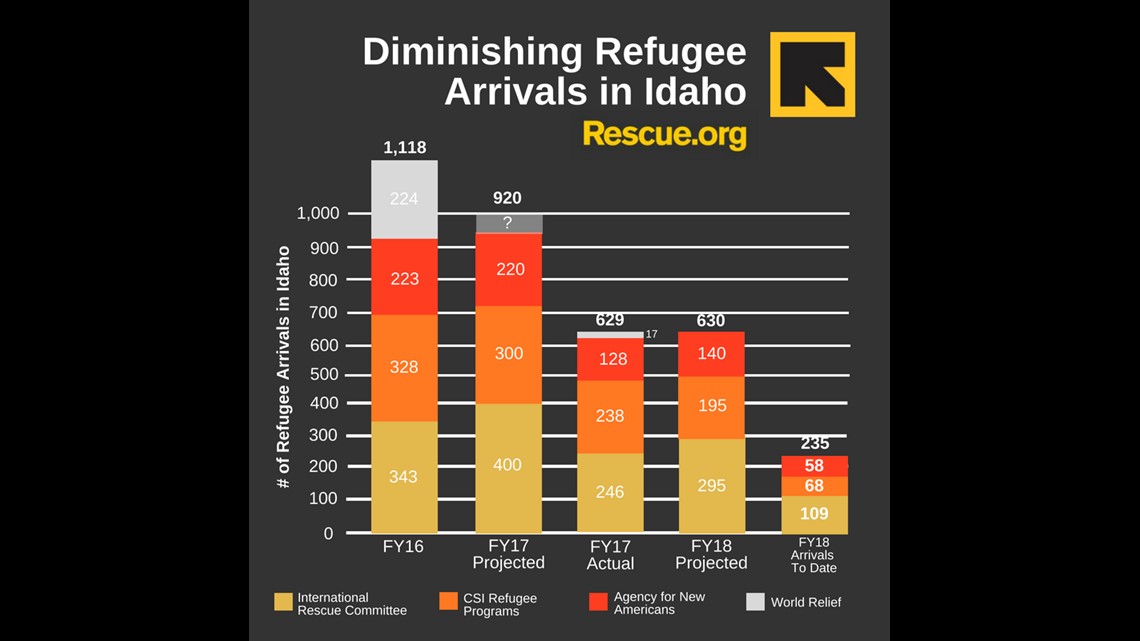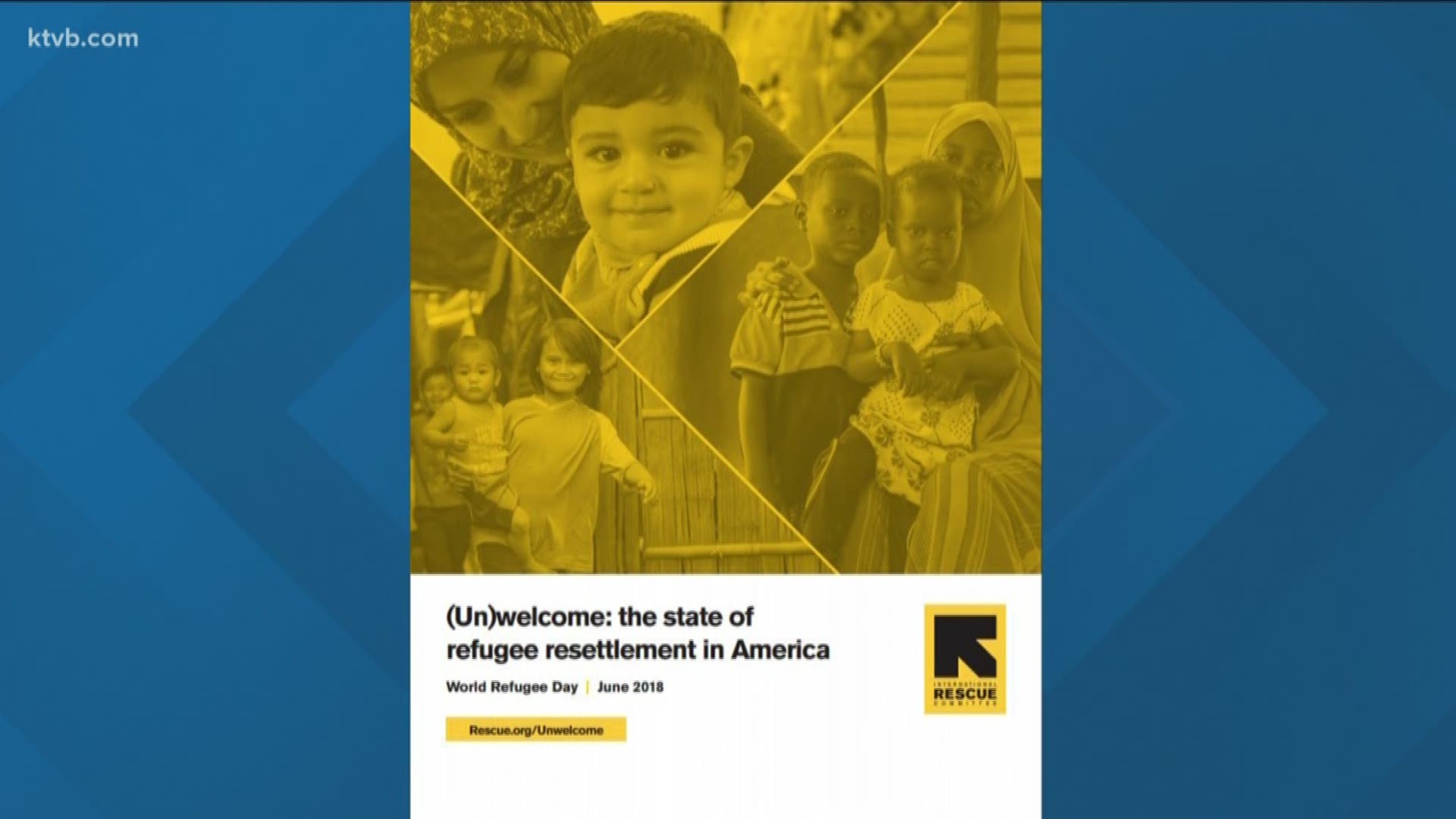BOISE -- In light of World Refugee Day, a report was released showing a significant drop in the number of refugees coming to America.
National data shows arrivals dropped 70 percent in the first seven months of fiscal year 2018 compared to the same time period last year: from 42,414 to 12,189 refugees.
Many are in limbo overseas as they flee persecution and violence. The impacts of the decline in arrivals are felt here in Idaho, with the International Rescue Committee (IRC) in Boise resettling no one from Iraq, Syria or Somalia this fiscal year.
KTVB dug deeper into the report and spoke with those affected by dwindling refugee arrivals. IRC released this graph, showing a huge decline in arrivals in Idaho:


In fiscal year 2016, 1,118 refugees came to the state. By fiscal year 2017, there were 629 refugees and to date, there have been 235 arrivals this fiscal year. The IRC doesn't expect that number to hit more than 400 by the end of the fiscal year in September.
"I consider all those refugees immigrants victims," Adel Kathem, who moved here from Iraq in 2009, said, "They are victims of wars."
Kathem has nieces and nephews in the Middle East who have been waiting for more than three years to reunite with their mother in Twin Falls.
"They applied with mom but they did not get approved or just waiting. They tell them it's pending," Kathem said. "She is wishing she would stay there with her kids because she is missing them."
The new report, titled "(Un)welcome: the state of refugee resettlement in America", shows refugee resettlement has been ground to a halt.
"There's refugees who as yet have no connection to the United States who are stopped. But there's also refugees whose family members are already here. Some of them are family members - we are not talking uncles, cousins, grandmothers - we're talking children, parents, spouses," Executive Director or International Rescue Committee in Boise, Julianne Donnely Tzul, said. "Everybody in that group is still in limbo."
International Rescue Committee says a series of policy changes under the current administration will lead to less than 21,000 refugees coming to the U.S. this fiscal year, marking the lowest arrivals ever in the program's history - amid a global humanitarian crisis. Since the program was created, the average number of refugee admissions is typically in the 90,000 range.
"The precise mechanisms that result in fewer people coming are ones that haven't been announced to the public, they haven't been put in an executive order or regulation or rule so we can't point to exactly what changes have been made that cause the decrease," Donnely Tzul said. "But it's definitely choices being made as to how decisions are finalized for people to come in. There's a clear distinction by nationality of who's able to make it through the system; we're seeing a tremendous drop-off in people who are from Syria, Iraq and Somalia."
There's a 60 percent drop in Christian refugee arrivals and an 80 percent drop in Muslim arrivals, according to the report.
"People are not optimistic regarding, especially, to the United States," Kathem said.
IRC polled a sample of more than 1,000 adults and found nearly 60 percent believe the United States has a moral obligation to help refugees. Those who work with refugees say the stark drop is hitting employers and the economy.
"There's a lot of evidence showing that refugees bring economic benefit to our community," Donnelly Tzul told KTVB. "It's also an economic loss... That means there are employers in the valley that don't have enough people to do what they need to do."
Idaho Dairymen's Association CEO Rick Naerebout says because of a labor shortage, businesses across the Gem State are struggling to fill jobs typically filled by refugees.
"Refugees have worked in the Idaho dairy industry for a number of years," Naerebout said. "We're in a shortage of dairy workers and they've been a good fit augmenting that shortage and helping to fill that void. But unfortunately with the decreased number of refugees coming to America we have fewer options of being able to have refugees fill the void we have within our workforce."
And many believe there is a void within the community; this study shows many Americans recognize resettled refugees contribute and share skills, talents, culture and customs.
"There is a loss, right, because each refugee family coming in brings vibrancy and knowledge of world history. Their unique experiences - they add to communities," Donnelly Tzul added.
"By relocating those refugees to America and communities like Twin Falls, we're a life saver, literally, often for these individuals. And it's just disappointing to look at those numbers and see that we're having that little of an impact on this really big crisis right now in the world," Naerebout added.
"If you look at them, most of them have kids, they have families. Their main concern is to live safely. And to find a job and just live safely," Kathem said.
Donnelly Tzul says 74 families in the Treasure Valley applied for family members to come here before the president took office. Since the executive orders played out in court, she says six have received approval letters but not one has landed here in Idaho.
On a lighter note: there's a World Refugee Day celebration on Saturday at the Grove Plaza. The cultural event will be held from 9:30 a.m.-1 p.m. Learn more on this page.
Read the full IRC report here.

